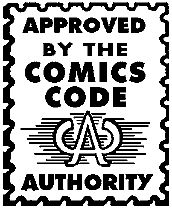It's safe to say few were sorry to see the Comics Code Authority quietly fade away in 2011, having become literally no more than a stamp on the covers of a handful of titles, but it was nonetheless an important part of history.
Sean Howe, author of Marvel Comics: The Untold Story, realized this three years ago and sent a letter to Heidi MacDonald, asking who had the files of the Comics Magazine Association of America, the trade association that administered the Code. While Howe thought the records had vanished, Mark Seifert was told they were donated to DC Comics.
This week, Howe reiterated his appeal on his blog:
The records of Josette Frank and the Child Study Association of America—which had challenged the comic-book scare of the late 1940—had been donated to the CMAA years ago. Now they have vanished, along with detailed notes on industry-wide meetings throughout the 1950s, 1960s, 1970s, and 1980s among Jack Liebowitz, Stan Lee, Carmine Infantino, John Goldwater, and others.
While he doesn't mention it specifically, DC's move next year to Burbank, California, adds a sense of urgency: It's possible that if the right person doesn't recognize the significance of the files, they may end up getting tossed. If that information disappears, historians will lose an important piece of comics history, perhaps forever.
To name just one example, Carol Tilley has done some fascinating research on the comics hysteria of the 1950s, the part that Frank and the Child Study Association played in promoting comics and allaying fears, and the animosity that Fredric Wertham had toward Frank and her colleagues, which may have influenced his actions. Without files such as these, our accounts of this era will be reduced to a few simple lines and we will lose the richness and texture that details in the files would provide.


